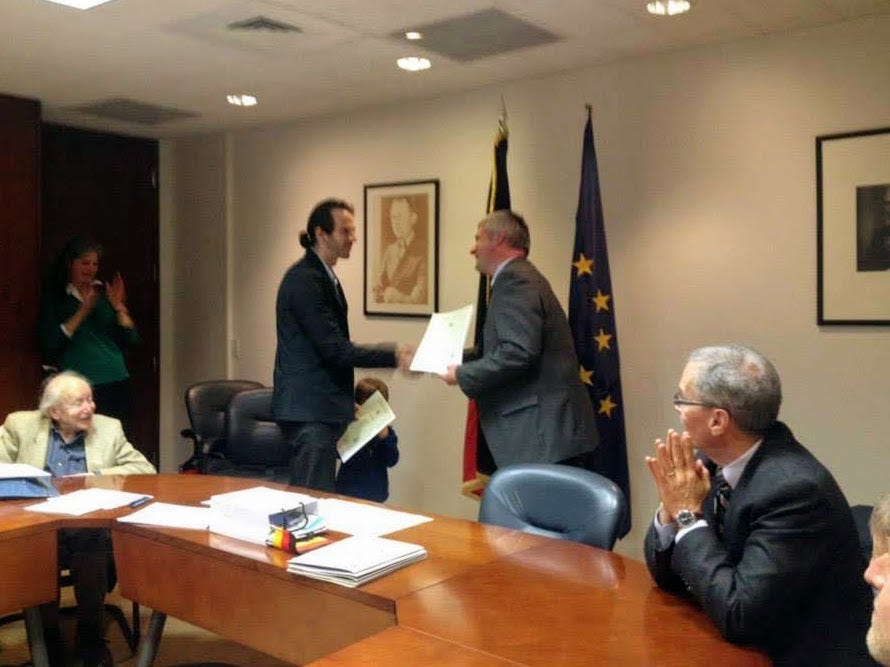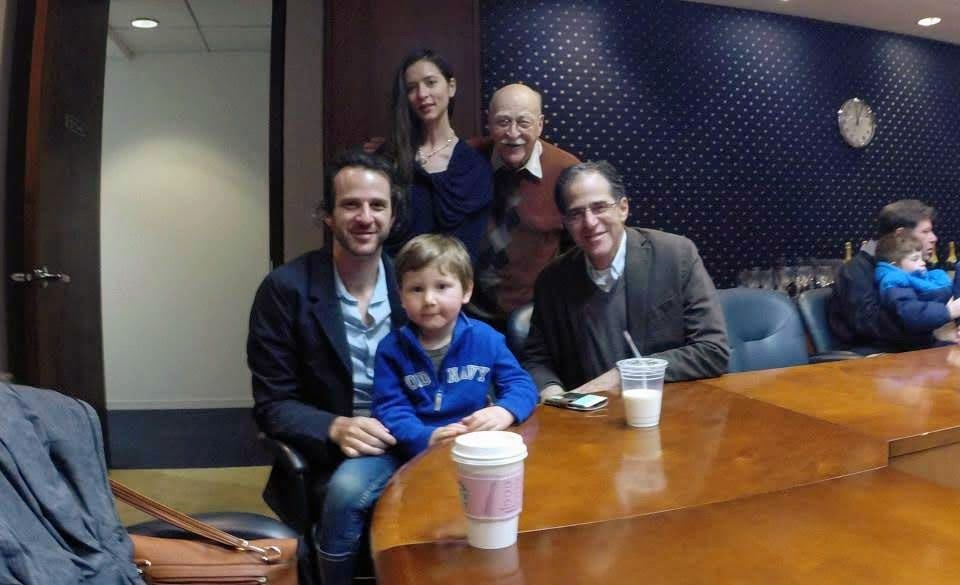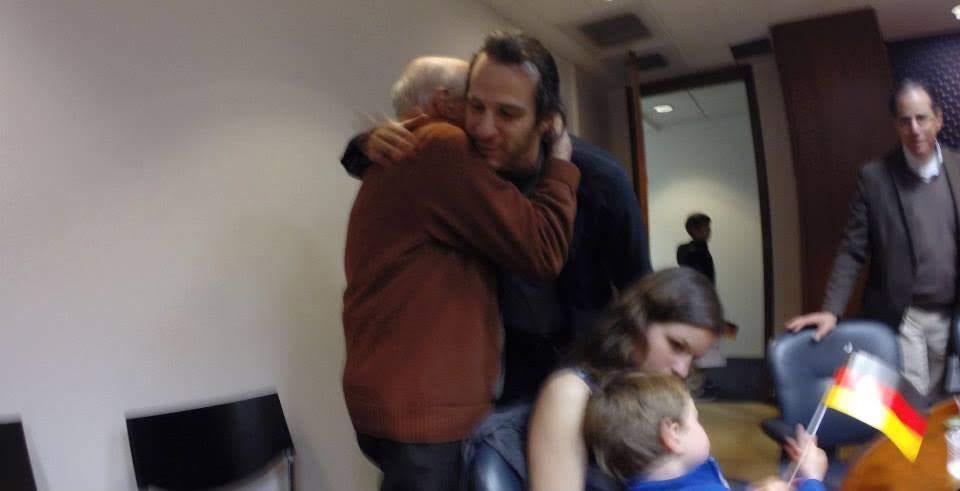How I got German citizenship
Many things are complicated about moving to Spain—fortunately, the visa part is a non-issue
It’s one of the first things I get asked—what’s your visa situation?
Fortunately, among the many difficult challenges of figuring out a move to Spain (see, “Feeling like a child”) this is not one of them. I have German citizenship, I always say—so the visa thing isn’t an issue for me.
I consider this, my German citizenship—nay my EU citizenship—to be one of the greatest of all possible privileges, perhaps second only to the enormous good fortune of having been born into the United States in the late 20th Century.
And yet, I only have this privilege because the German government feels guilty, because it is trying to make amends for one of the greatest atrocities ever committed in human history. Or, perhaps I have it because—as the German head of consular affairs told a room of soon-to-be-repatriated Jews during the citizenship ceremony in Washington D.C. nine years ago—we believe healing to be possible.
My grandfather’s journey
My grandfather, Theodor Max Simon, was born in Germany in 1922.
He and his siblings and parents were early to leave. They emigrated to Holland in 1933, the same year Hitler came to power. But very quickly, they decided that Holland was still too close, so in 1934 they emigrated to Brazil, where my grandfather’s family had cousins.
As a result, I still have family in Sao Paulo, though I’ve yet to meet them—these are the descendants of my grandfather’s brother and sister, both of whom made their home in Brazil for the rest of their lives. My grandfather, however, decided to come to the United States for College. There, he attended the University of Connecticut and met my grandmother, Marjorie Ann Gabor.
They were married for more decades than I’ve been alive. I remember my grandfather’s 80th birthday, his three kids and their kids, my cousins, gathered around the dining room table in West Hartford, Connecticut. There, my grandfather told us all that his family was the thing he was most proud of in the world. My grandfather was also kind, patient, a connoisseur of classical music, and spoke four languages. He retired from a technical staffing company before I have memories, swam in the senior Olympics, and amassed so many gold medals that he took to giving them away to any great-grandchildren who ogled them.
On one of the last trips I took to visit him, he gave one to my son.
The process of applying for German citizenship
Technically, what I applied for was to be repatriated.
The Nazi regime deprived my grandfather and his family of their German citizenship—the current government was offering to give it back. Not just to him, but to his descendants as well.
It was my sister who first jumped on it. She had lived in the UK already and felt more at home in Europe than in the U.S. She gathered the paperwork, applied, and was accepted, and I followed in her footsteps.
In order to be eligible, we had to show that my grandfather was Jewish, had been born in Germany, and had left sometime during the years 1933 - 1945 (The German embassy has an explanation of the law here). Then we had to show that I was his grandson.
Here’s what I needed to submit the application:
My grandfather’s German birth certificate
His Brazilian naturalization
His American naturalization
His and my grandmother’s marriage certificate
Their Torah marriage certificate
My father’s birth certificate
My mother’s birth certificate
Their marriage certificate
My birth certificate
My passport
Some of these needed to be an original document; some could be certified as a true copy by a notary public. My sister had already compiled most of them. She had done the hard work and had asked our grandpa for the documents.
In return, my grandpa had asked us both: why are we doing this?
He didn’t understand why we would want citizenship in a country that had done what it had done. He hadn’t forgiven, at least not completely. He did once take a trip back to Germany, to see his hometown, and to meet the people, not Jews, who lived there. He told me the trip had done a lot to shift his opinion of the German people, even if it hadn’t healed all wounds.
We told him that for us, it wasn’t really about Germany. We wanted the option to live, work, or go to school anywhere in the EU. My son was four years old at the time and I would be able to apply for him as well. I wanted this for me, but I also viewed it as my solemn responsibility as a father to provide those options to my son if they were available. Those were the practical reasons.
Then there was the symbolism. To us, German citizenship was a step toward an identity as global citizens. We were American by accident of birth or because of choices our ancestors made. But this would be a deliberate choice not just for dual citizenship, but for greater freedom and more options in the world.
I remember trying to communicate these things to him as he silently nodded and listened and me wondering whether we could ever come to the same understanding of what I was doing, or whether the gulf was just too far, the trauma of the Holocaust still too present.
The whole process took about six months, but eventually, I received an email that my application for naturalization had been accepted. I was invited to a citizenship ceremony at the German consulate in Washington D.C.
My memory of that day is very special. I invited my dad, grandpa, and sister to attend, and they all were able to make it. My son’s mom, who had supported the process the entire way, also attended.
In 2014, the German embassy in D.C. was undergoing renovations, so the ceremony was held in a large, non-descript conference room in a building they were using as a temporary consulate space. There were about 20 to 25 people there, seated around a large U-shaped conference table. Some were Jews my grandfather’s age, and their families, but most were younger.
The head of the consulate gave some brief remarks. He talked about forgiveness and said that on behalf of the German government, he was honored that we had chosen to accept the offer of naturalization. He said nothing could repair the terrible atrocities of history perpetrated by his country, but that each one of us was evidence that there was some possibility for healing, and for that he thanked us.
Then, one by one he called our names to receive our naturalization certificates—the paper that proved we were now German citizens. When I walked up with my son, he thanked me and asked if I had ever been to Germany. I had, once, for a long weekend in Munich during Oktoberfest. I had done two things on that trip: drink a lot of excellent German beer and visit the former Nazi concentration camp in nearby Dachau, the one with the words, Arbeit macht frei (“Work sets you free”) still carved into an iron gate above the entrance.
Then, he bent down and tried to shake my son’s hand. He was quite shy and not talking a lot back then:
After the ceremony, there was a small reception with food and drinks, and we took some more pictures:
Germany and the European Union
Sometimes I don’t think Europeans appreciate just how much of a triumph of civilization the EU is (and we know the Brits didn’t appreciate it).
The EU is currently twenty-seven countries, packed into a peninsula less than half the size of the United States, all with different languages and cultures and overlapping histories. In a place that had more or less been in a constant state of war with itself for thousands of years, there is now peace and prosperity, cheap wine and fresh olive oil, stunning natural landscapes, and many of the most livable cities in the world.
The EU is not perfect, and neither are its constituent members. From what I can tell, most Europeans experience the EU as a distant, faceless bureaucracy—and that is part of its success. Germany, the rich one of the bunch, sometimes resents that it must support poorer countries like Greece or Italy. And meanwhile, the Greeces and Italys sometimes resent Germany for its economic dominance and privileged role in setting the continent’s fiscal and foreign policy.
On this most recent trip to Spain, I experienced my own first taste of EU regulation as I shopped for an old 4x4 that would take me into the mountains on the weekend: Barcelona, like many larger European cities, has a low-emissions city center designed to reduce air pollution from traffic. Thus, from 7am to 8pm on weekdays, one is not allowed to drive any car made before 2000—which is when a continent-wide emissions standard for all cars sold in the EU went into effect.
I kind of had to admire the bureaucratic and regulatory simplicity.
There have been various points in my life when it seemed like the EU might endure a slow-rolling collapse into itself and take its place in the dustbin of history as a grand utopic vision yet ultimately failed experiment. Yet watching the messy divorce of Britain seems to have headed off attempts by other countries to leave, at least so far. It’s difficult to know what the future holds, but of course, I hope the EU survives and thrives.
A faceless, distant bureaucracy is usually not the most popular thing, but I have to wonder if most Europeans in the back of their minds don’t begrudgingly appreciate the general peace and stability that the EU has wrought. And meanwhile, there has been no slow disintegration of national culture or pride—France is still France, Spain still Spain, and Germany still Germany.
After the ceremony, I applied for a German passport, which I received and have used to travel through Europe ever since. My son has grown up knowing he has both U.S. and German citizenship, and one day perhaps he will make use of Germany’s completely free system of higher education. Maybe one day he will decide to live and work in Europe and make one of these wonderful countries his home.
If he does, he will have me, my grandfather, my sister, and Germany—both its unwavering support for the European Union and its efforts to make amends for its terrible history—to thank.
Finally, it is not hard to imagine a country that would dodge blame for what happened, one in which the current government washes its hands and says, it wasn’t OUR administration who did all that, after all. In the U.S., it’s not hard to imagine such a program being defended by one administration but reversed by executive order by the next. The fact that Germany maintains this program at all is, in a sense, a national affirmation of collective culpability and responsibility. The naturalization program exists, even if you believe none of us should be held responsible for the sins of our fathers.
I also understand that some Germans might resent the fact that I now have access to all the same privileges of citizenship as they do, despite not having been born or ever having lived there (though none have ever expressed such resentment to me). The response, I think, should be to treat this extreme privilege with respect. To understand that it is a gift, born out of something terrible and that now I too have a responsibility.
What is that responsibility? Figuring that out is probably the project of a lifetime, but I think it is something like this: to reject tribalism and jingoism. To reject those beliefs intended to divide us or set up the “other” as a scapegoat. And instead, to go toward our common humanity. To emphasize that—as a certain U.S. president once said better than I could (I honestly do not get tired of quoting this)—we all breathe the same air, we all cherish our children’s future, and we are all mortal.






Well done Russ. I very much enjoyed reading this family history.
What touched me the most in this piece is your story about the conversations with Grandpa and your reflections on the different backgrounds for your decisions and his thoughts. In your description I could sense the conversation and recognise Dad's approach - where he wonders and asks you about your motivation and listens and considers your answers - and thereafter, independent of his own thoughts and feelings, shows respect for your decision and for his own principles, by attending the ceremony - no matter how hard it might have been. You are/were one of the few who could get him to talk about these topics that he didn't talk easily or openly about - I wonder if they challenged his decision to be positive about life and the world? I'm glad he had you in his life. It's also interesting to me that the way you explain your responsibility for all that is and has been is very similar to mine.